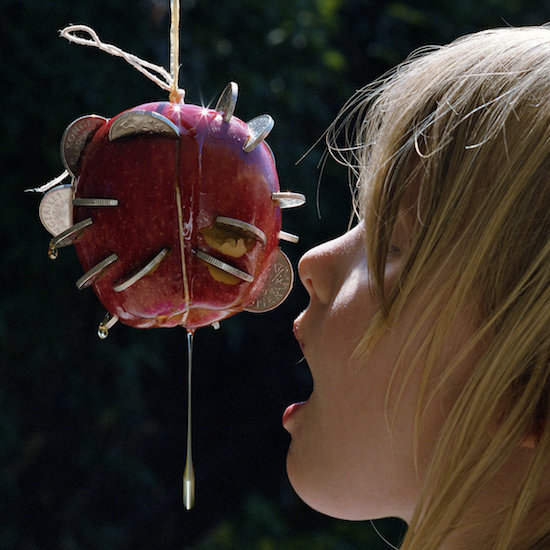Frederikke Hoffmeier’s fourth album as Puce Mary concerns itself with the aesthetics of hunger and thirst, and the inevitable outcome of coping with an apocalyptic drought. Torbjørn Rødland’s wonderfully rendered album art provides us with such a vivid representation depicting the many forms of hunger and libidinal drives caused by such malnourishment. From such an expressive image, The Drought sees the continuing transformation of Puce Mary and her music, from monochrome blasts of industrial noise, to dense, intricate vistas of dread.
While creating its textures, Hoffmeister articulated what she terms “a transformation through a psychological famine,” where “vulnerability is confronted through regeneration”. After the opening track ‘Dissolve’ – in which circular drones buzz harshly overhead and an unnameable thing tears through the space – ‘A Feast Before The Drought’ presents humanity lurching remorselessly in a blizzard of orgiastic noise and mournful howls. From here on, all that’s left is ambient desolation. But what really intrigues – and at times unsettles – is not so much the splintering power of noise and its abrasiveness, but rather the gaps of eerie stillness that are devoid of energy and agency.
For someone starved of food, culture, or agency, the only noble response to this situation is one of violence. As with 2016’s The Spiral and her 2014 split album The Female Form, Hoffmeier uses genre motifs of noise and industrial music here, not so much to bombard the listener with adolescent fantasies of power, transgression and provocation, but instead to look at such violence as possessing empathy based on action and transformation.
The visceral power of Hoffmeier’s music, such on the jarring ‘Fragments of a Lily’, heaves and almost buckles under the weight of its own brutality. But throughout The Drought, Hoffmeier instead concerns herself with themes of estrangement and desire, and how we cope when such feelings can be all-encompassing towards our bodies, and even our identities. This is writ large in the second half of the album, where ‘The Size Of Our Desires’ and ‘The Transformation’ mixes body horror and soundtrack dynamics, complete with bleak silence, guttural drones and rhythms. At the centre is Hoffmeier herself, uttering lines such as “you’re lost in your apocalypse. Now you have neither shape nor size” with the detachment of someone who both recoils from, and is intrigued by such imagery.
The high-point of this physical alienation is ‘Red Desert’, which takes its cue from the the 1964 Michael Antonioni film of the same name. Like the film, the desert and wastelands are not so much topographical but industrial and existential, of a person withering away in an uncaring environment. Hoffmeier, in an anaesthetised yet intense monologue, lays out the depth of her existential disaffection: “I find myself feeling like decades have passed / I’m an old woman now, and I have lost my attraction / I’m tortured by a feeling of drowning under you, under society under politics and the decay of nature, my lack of interest / … and I feel desperate … I feel my eyes tearing up what should I do with them what should I watch?”
Accompanying her lyrics is music that builds in acrimony with discordant synths, clattering needles and formless heaving, before giving way to a humanistic heartbeat and sacred organs that build into an exploding sea of feeling.
If the The Drought concerns itself with metamorphosis, we can see it in how Hoffmeier has transformed herself as Puce Mary, from her earliest tape releases of formless expressions of noise in the darkness, to transmitting ideas and feeling through an increasingly complex musical vocabulary. This is her strongest album to date and one where “noise” is but a tool towards a much more expansive expression of music.


